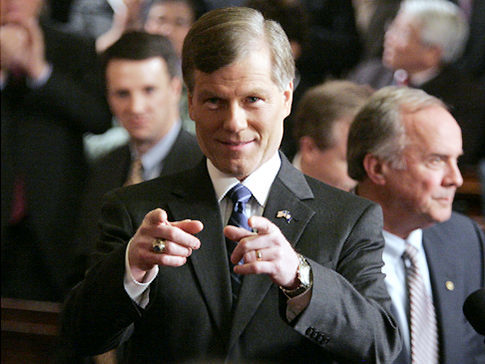Virginia Gov. Bob McDonnell, a Republican, employed his line-item veto authority to save the state’s taxpayers $424,000 initially budgeted for public broadcasting. The reduction represents 16 percent of what the state had appropriated for educational programming for the fiscal year beginning July 1. All told, McDonnell has cut total state funding for public broadcasting by 25 percent since 2010.
“When I took office, I pledged to refocus state government on its core functions by finding ways to make government more efficient and effective, and to wisely spend the hard-earned money of Virginia taxpayers,” McDonnell said in a May 3, 2011, statement. “That is why, in returning the signed appropriation bill, I have decided to reduce the appropriation made to public television and radio stations.”
McDonnell’s veto marks his third effort since December 2010 to reduce funding for public broadcasting. He initially proposed a 50 percent cut as the first step in fully eliminating taxpayer support for public radio and television.
‘A Practical Budget Decision’
This past March, McDonnell proposed a budget amendment to reduce public broadcasting funding, but it was defeated in the Democrat-controlled Senate. Following his May budget victory, the governor said he’s intent on eliminating the subsidy completely over the next two years.
“In today’s free market, with hundreds of radio and television programs, government should not be subsidizing one particular group of stations,” McDonnell stated, adding the cuts are “a smart, practical budgeting decision to make Virginia government smaller and more efficient and save taxpayer dollars.”
Michael Thompson, president of the Thomas Jefferson Institute, a Virginia-based think tank, says the various interest groups in Virginia have been “pretty quiet” in reacting to the cuts.
Thompson says government funding of public broadcasting isn’t necessary. “NPR should be able to raise private funds at this point in time,” he said.
Notable to Thompson is the lack of public backlash against the move, which he describes as “none that anyone can see.”
Quality Without Public Support
David Boaz, vice president of the Cato Institute, a Washington DC-based conservative think tank, agrees with Thompson’s assessment.
“Despite the pervasive liberal tilt, I think public broadcasting does deliver high-quality programming,” Boaz said. “That’s why it reaches a relatively small audience of educated and affluent people. Personally, I’m delighted to get high-quality programs, but I don’t see why taxpayers should have to pay for them,” he said.
“Does government funding improve the quality of public broadcasting?” asked Boaz. “Well, we haven’t really tried ‘public broadcasting’ without government funding.”
Boaz noted other networks also deliver high-quality programming, including commercial-free music on SiriusXM and dramas and documentaries on HBO and Showtime. “Advocates for public broadcasting always insist that government funding is a very small percentage of their funding,” he said. “OK, then, they could live without it. Lots of businesses and news organizations and nonprofits have had to cut back in the past few years and have survived,” he said.
“The real problem” with public broadcasting, said Boaz, “is not the relatively small cost. It’s that broadcasting deals with ideas—sometimes very basic and provocative ideas—and government should stay out of the production and dissemination of ideas,” he said.
“I favor separation of news and state for the same reason that I favor separation of church and state,” Boaz concluded. “Because we should have a marketplace of ideas, without government’s thumb tipping the scales toward certain ideas and perspectives.”
Loren Heal ([email protected]) writes from Neoga, Illinois.





